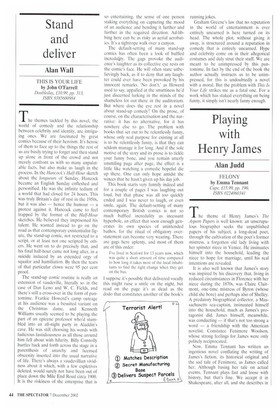Stand and deliver
Alan Wall
THIS IS YOUR LIFE by John O'Farrell Doubleday, £10.99, pp. 313, ISBN 0385600984 T he themes tackled by this novel, the world of comedy and the relationship between celebrity and identity, are intriguing ones. We are fascinated by great comics because of their heroism. It's heroic of them to face up to the things the rest of us are busily trying to forget and then stand up alone in front of the crowd and not merely confront us with so many unpalatable facts, but also make us laugh in the process. In the Hancock's Half-Hour sketch about the longueurs of Sunday, Hancock became an English Sunday enfleshed and personified. He was the infinite tedium of a world that had closed for 24 hours. This was truly Britain's day of rest in the 1950s, but it was also — hence the humour — a protest against it. Hancock came to feel trapped by the format of the Half-Hour sketches. He believed they imprisoned his talent. He wanted instead to go on the road as that contemporary existentialist figure, the stand-up comic, not restricted to a script, or at least not one scripted by others. He went on to do precisely that, and his final half-hour came not long after, in a suicide induced by an extended orgy of squalor and humiliation. By then the tears of that particular clown were 95 per cent proof.
The stand-up comic routine is really an extension of vaudeville, literally so in the case of Dan Leno and W. C. Fields, and there's still a cross-over in the form of pantomime. Frankie Howerd's camp outrage at his audience was a besuited variant on the Christmas dame, and Kenneth Williams usually seemed to be playing the part of an epicene professor who'd stumbled into an all-night party in Aladdin's cave. He was still choosing his words with ludicrous fastidiousness as all those around him fell about with hilarity. Billy Connolly hurtles back and forth across the stage in a parenthesis of anarchy and licensed obscenity inserted into the usual narrative of life. There's always a vaudevillian vividness about it which, with a few expletives deleted, would surely not have been out of place down the Mile End Road circa 1900. It is the riskiness of the enterprise that is so entertaining, the sense of one person staking everything on capturing the mood of an audience and bending it further and further in the required direction. Ad-libbing here can be as risky as aerial acrobatics. It's a tightrope walk over a canyon.
The default-setting of many stand-up comics has often been a look of baffled incredutity. The gags provoke the audience's laughter as its collective eye rests on the comic's face. He will often stare unbelievingly back, as if to deny that any laughter could ever have been provoked by his innocent remarks. No don't,' as Howerd used to say, appalled at the smuttiness he'd just discerned lurking in the minds of the shameless lot out there in the auditorium. But where does the eye rest in a novel about stand-up comedy? On the prose, of course, on the characterisation and the narrative: it has no alternative, for it has nowhere else to go. The problem with books that set out to be relentlessly funny, whose only real purpose for existing at all is to be relentlessly funny, is that they can seldom manage it for long. And if the sole motive of the story and its prose is to tickle your funny bone, and you remain utterly unsmiling page after page, the effect is a little like watching a comedic hopeful die up there. One can only hope amidst the winces that he hasn't given up his day job.
This book starts very funnily indeed and for a couple of pages I was laughing out loud, but that phase was all too quickly ended and I was never to laugh, or even smile, again. The default-setting of many contemporary British comics is not so much baffled incredulity as incessant hyperbole, an effect that soon enough generates its own species of unintended bathos, for the ritual of obligatory overstatement can become very wearing. There are gags here aplenty, and most of them are of this order:
I've lived in Seaford for 13 years now, which was quite a short amount of time compared to how long it takes most of the local inhabitants to find the right change when they get on the bus.
I suppose it's possible that delivered vocally this might raise a smile on the night, but read on the page it's as dead as the dodo that constitutes another of the book's running jokes.
Graham Greene's law that no reputation in the world of entertainment is ever entirely unearned is here turned on its head. The whole plot, without giving it away, is structured around a reputation in comedy that is entirely unearned. Hype and celebrity come on in their allegorical costumes and duly strut their stuff. We are meant to be unimpressed by this pantomime. In fact by the end of the book the author actually instructs us to be unimpressed, for this is undoubtedly a novel with a moral. But the problem with This Is Your Life strikes me as a fatal one. For a work which has staked everything on being funny. it simply isn't nearly funny enough.










































































 Previous page
Previous page